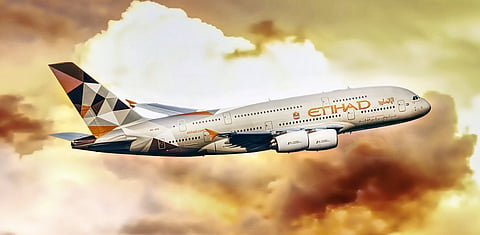First Flight to Use Sustainable Aviation Fuel Takes off from Tokyo
The first Etihad Airways flight to use Sustainable Aviation Fuel (SAF) supplied by ITOCHU Corporation and NESTE took off from Tokyo Narita airport on October 27.
The pioneering flight, EY871 departed Tokyo Narita, was the result of a partnership in which ITOCHU provided Neste MY Sustainable Aviation Fuel to Etihad, the UAE national airline, making Etihad the first international airline to procure SAF in Japan.
Cassie Mackie, Vice President Procurement & Supply Chain of Etihad Airways, said: “The aviation industry needs partnerships like the one we have created with ITOCHU and NESTE to bring widespread SAF adoption to the industry.
Tetra Pak, Nuitree Food to Establish Plant-Based Factory in UAE
"We are extremely proud to be the first international airline to procure and use Japanese supplied SAF on flights departing Japan and to see this partnership take to the air.
“Etihad is committed to achieving net zero emissions by 2050 and reducing our 2019 emissions by 50 percent by 2035. This type of collaboration between governments, corporates and the aviation sector helps pave the way for broader adoption.”
The flight reduced CO2 by approximately 75.2 tCO2, based on the estimated fuel volume at a blend of 39.66% SAF.
The flight also managed non-CO2 environmental impacts through optimised flight planning for contrail prevention, deploying SATAVIA technology for a forecast net climate impact reduction of 71 tCO2e.
Aircraft condensation trails, or contrails, cause surface warming responsible for up to 60% of aviation’s overall climate footprint.
Until recently, technical challenges made contrail prevention difficult or impossible, but UK-based SATAVIA’s atmospheric modelling now enables flight plan optimisation for contrail prevention in addition to post-flight climate impact analysis.
ITOCHU has already established a domestic SAF supply chain at Haneda and Narita International Airports, spanning from SAF import and quality control to delivery to airports, as well as a refueling network for the aircrafts themselves.
ITOCHU plans to expand its SAF supply base to Central Japan International Airport and Kansai International Airport, allowing it to further increase the supply of SAF to both Japanese and international airlines.
Read more: Integration of Sustainability in Supply Chains at Dubai Dialogue 2022


